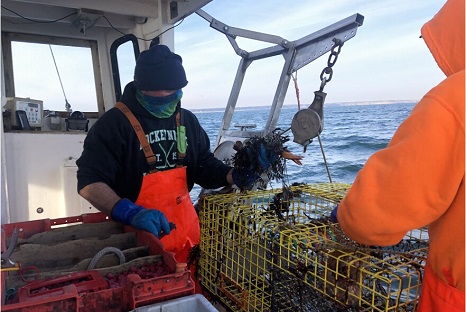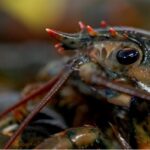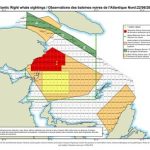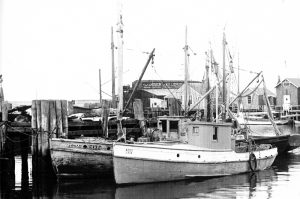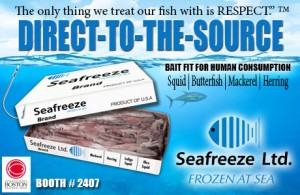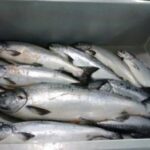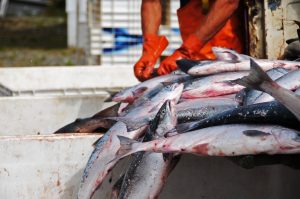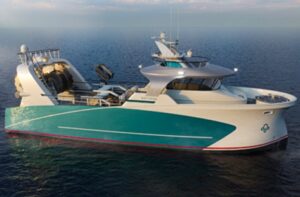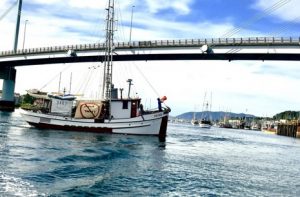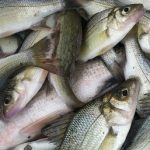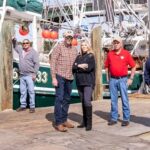Tag Archives: Beth Casoni

Mass. Lobstmen Win Case Fighting Feds’ Fishing Closure
A Massachusetts federal judge ruled Thursday that the National Marine Fisheries Service illegally closed a 200-square-mile swath of ocean to protect the endangered North Atlantic Right Whales, backing a legal challenge by a lobster fishing industry group. In a ruling from the bench, U.S. District Judge William G. Young said the agency’s permanent seasonal closure of the so-called wedge area to lobster fishing in February 2023 to avoid whale entanglements with fishing gear was contrary to a federal budget law passed the previous December that hit pause on new regulations for the lobster industry until the end of 2028. “This court is convinced that the Consolidated Appropriations Act of 2023 is clear on its face, and it clearly applies to bar the final wedge closure rule,” Judge Young said. more, >>click to read<< 12:35
Interview: Massachusetts lobstermen want to invent a better lobster trap
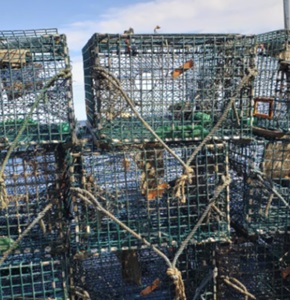 For years, right whale advocates and engineers have been trying to develop new lobster fishing gear designed to prevent whales from entanglements. But most local lobstermen say they’re against this so-called “on demand” fishing gear that’s been created. Now, as CAI’s Eve Zuckoff reports, lobstermen have decided to come up with their own technology. Eve, you were the first to report this, thanks for being here this morning. Eve Zuckoff: Thanks for having me. Patrick Flanary: So the Massachusetts lobstermen’s association has just been awarded a $1.2 million grant to develop new fishing gear. What’s their proposal? more, >>click to read<< 09:47
For years, right whale advocates and engineers have been trying to develop new lobster fishing gear designed to prevent whales from entanglements. But most local lobstermen say they’re against this so-called “on demand” fishing gear that’s been created. Now, as CAI’s Eve Zuckoff reports, lobstermen have decided to come up with their own technology. Eve, you were the first to report this, thanks for being here this morning. Eve Zuckoff: Thanks for having me. Patrick Flanary: So the Massachusetts lobstermen’s association has just been awarded a $1.2 million grant to develop new fishing gear. What’s their proposal? more, >>click to read<< 09:47
New England lobstermen threaten to sue feds over planned Massachusetts fishing closure
 NOAA is looking to permanently add a wedge between state and federal waters to an existing closure that stretches roughly 9,000 square miles off the Massachusetts coast, a measure feds have put in place to preserve the North Atlantic right whale. An emergency rule prohibited trap and pot fishery buoy lines on the wedge during the past two years, but the feds are looking to make the zone permanent and have the backing of the Massachusetts Division of Marine Fisheries. The proposed permanent expansion to the Massachusetts Restricted Area has caught lobstermen by surprise. Dustin Delano, chief operating officer of the New England Fishermen’s Stewardship Association, took exception to the “recklessness” of the proposal after an amendment was included in this year’s $1.7 trillion federal spending bill that looked to delay protections for the North Atlantic right whale by six years. >>click to read<< 11L27
NOAA is looking to permanently add a wedge between state and federal waters to an existing closure that stretches roughly 9,000 square miles off the Massachusetts coast, a measure feds have put in place to preserve the North Atlantic right whale. An emergency rule prohibited trap and pot fishery buoy lines on the wedge during the past two years, but the feds are looking to make the zone permanent and have the backing of the Massachusetts Division of Marine Fisheries. The proposed permanent expansion to the Massachusetts Restricted Area has caught lobstermen by surprise. Dustin Delano, chief operating officer of the New England Fishermen’s Stewardship Association, took exception to the “recklessness” of the proposal after an amendment was included in this year’s $1.7 trillion federal spending bill that looked to delay protections for the North Atlantic right whale by six years. >>click to read<< 11L27
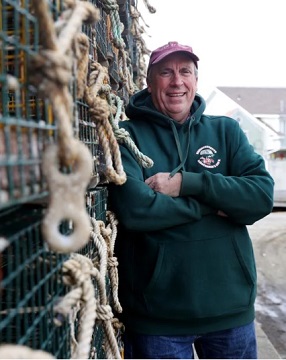
California sustainability group told people to stop eating lobster, so Massachusetts lobstermen file suit
Standing on a dock in his hometown of Gloucester, Mass., lobsterman Arthur Sawyer looked out at the peaceful, calm waters off of Cape Ann. Sawyer, president of the Massachusetts Lobstermen’s Association, and three other Bay State lobster fishers filed a class action lawsuit earlier this month against Monterey Bay Aquarium and the international Marine Stewardship Council, groups that consider lobstering a major risk to North Atlantic right whales and, hence, people shouldn’t buy lobsters anymore. “They have gone overboard targeting Massachusetts when we’ve been doing everything,” Sawyer told the Herald. “We have 100 percent closure right now. There is no place safer for right whales right now on the east coast than in Massachusetts waters.” >click to read< 11:12

In class action lawsuit, Massachusetts lobstermen fight efforts to ‘red list’ their catch
Four Massachusetts lobstermen have filed a class action suit against the Monterey Bay Aquarium and Marine Stewardship Council, groups that urged distributors and grocery stores to avoid purchasing lobster because of the fishery’s impact on North Atlantic right whales. “We’ve always been like the punching bag for, like, the whale people. So I’m glad we’re finally striking back,” said plaintiff Jarrett Drake, a lobsterman who fishes out of New Bedford, “because it gives us a chance to try to at least defend ourselves.” “When [Montery Bay Aquarium] chooses to tag a product as one to be avoided (“red-list”) on Seafood Watch, it acts with near certainty that the companies it collaborates with will immediately discontinue that product,” the plaintiffs say in their complaint. >click to read< 08:35

Biden Administration sued by Massachusetts lobstermen for closing waters to protect endangered whales
Massachusetts lobster fishermen have filed a lawsuit against the Biden administration over its closure of fishing grounds done with the intention of protecting an endangered species of whale. The lawsuit stems from the February 1 closure of 200 square miles of the Massachusetts Bay that will prevent lobster fishing until the end of April in a move that the National Oceanic and Atmospheric Administration says was necessary to protect the North Atlantic right whales from being tangled in fishing ropes. Video, >click to read< 08:02
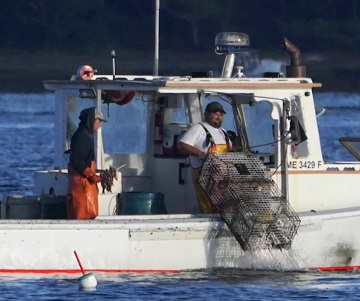
Lawmakers issue strong rebuke after con group adds lobster to ‘red list’
Seafood Watch, a conservation organization based at the Monterey Bay Aquarium in California, this week put North Atlantic lobster on its “red list” of seafood to avoid, as a hope to protect endangered species like the North Atlantic right whale. Since the announcement, lawmakers from both states, Maine and Massachusetts, have issued a strong rebuke against the conservation organization, coming to the defense of an industry they say is unfairly being targeted. Sen. Angus King, I-Maine., held a press conference with Maine’s Governor Janet Mills and joined a statement cosigned by Maine’s entire congressional delegation, calling the “red list” designation “reckless” and “irresponsible.” “Massachusetts Lobstermen know this issue, care about this issue, and have remained committed to doing their part despite regulations that entail major sacrifices by the industry,” Sen. Ed Markey, D-Mass. Video, >click to read< 09:50

Massachusetts: New relief fund would buoy lobster industry
A proposed state fund would provide financial relief to commercial lobstermen whose livelihoods are being impacted by state and federal regulations aimed at protecting critically endangered north Atlantic right whales. Tucked into a $52.7 billion state budget awaiting action by Gov. Charlie Baker is a proposal to create a new grant program with $500,000 in initial funding. The plan calls for providing grants of up to $5,000 to licensed lobstermen to help offset the cost of purchasing new gear and equipment needed to comply with the new whale protection rules. The grant money must be distributed in a “geographically equitable manner” under the proposal. Senate minority leader Bruce Tarr, R-Gloucester, who pushed for the funding, said it will help buoy lobstermen who are struggling to afford the expense of upgrading their gear and equipment. >click to read< 17:50

Broad right whale regulations decried by Massachusetts lobster industry
Lobster industry representatives and conservationists are pondering regulations aimed at protecting right whales, which continue to hamper Massachusetts fishermen causing months of lost income. Since 2015, lobstermen have had to work around area restrictions prohibiting fishing in gillnet fisheries during the time right whales are often present. So far, the Bay State has reduced its risk to right whales by 92% through a suite of measures including closures, weak rope, line diameter restrictions and trawling up, Casoni said. >click to read< 11:11
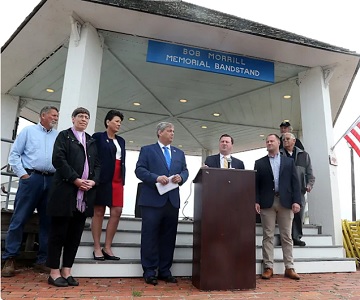
Massachusetts: Lawmakers want to pay lobstermen during right whale conservation closure
State senators next week will debate a plan by South Shore lawmakers to pay lobstermen during a months-long annual fishing closure advocates say cuts income of some fishermen by as much as half each year. State senators Patrick O’Connor and Bruce Tarr have filed a budget amendment that would allocate $12 million to pay lobstermen $1 per week per trap they are licensed for during time they are not allowed to fish. The state annually shuts down more than 9,000 square miles of water for at least three months in efforts to protect migrating right whales. > click to read < 08:28
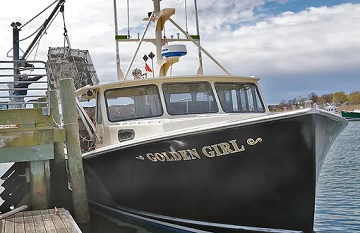
Massachusetts state lobster closure extended
As has become an annual tradition, the state’s yearly fishing closure to protect right whales has been extended until mid-May, cutting short a season already slashed in the name of species protection. The state sent out a notice to lobstermen Friday that the closure for 9,000 square miles of water, tentatively set to end May 1, would be extended through May 15 due to the presence of whales off the coast and near the Cape. For now, Massachusetts lobstermen are restricted to fishing in federal waters, where the season started at midnight Sunday, May 1. >click to read< 11:12

Gulf of Maine: Lawsuits over North Atlantic right whale regulations coming to boil
Lobsterman Brian Cates lives so far at the edge of Maine he can look out the windows of his house and see Canadian boats out in Canadian waters. Cates and other New England lobstermen are worried about how the coming regulations issued by the National Marine Fisheries Service will affect their livelihoods. Cates fishes in disputed waters. There, around the mouth of the Bay of Fundy, there’s a strip of ocean claimed by both Canada and U.S. alike called the grey zone. Cates fishes up against Canadian lobstermen, their traps and lines often getting caught up on one another. And the rules coming down from the federal government are not helping, >click to read< 19:14
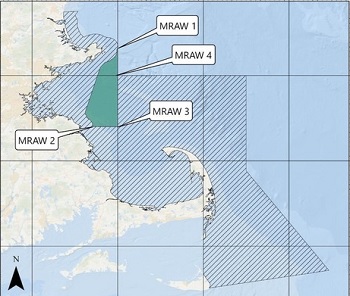
Feds institute ’emergency’ lobster closure to protect right whales
The federal government will close an additional 200 square miles off the coast of Massachusetts to lobster and Jonah crab fishing in April to protect endangered right whales. The National Oceanographic and Atmospheric Administration (NOAA) is closing the area on an “emergency” basis, without taking public comment, a move that frustrates lobstermen already contending with extensive fishing restrictions. >click to read<
Emergency Closure for Lobster and Jonah CrabTrap/Pot Fishery: Area Between Massachusetts Restricted Area and Massachusetts Restricted Area North for April 2022 – Lobster and Jonah crab trap/pot fishermen fishing in the federal waters between the Massachusetts Restricted Area North and the Massachusetts Restricted Area must remove all trap/pot gear from this area, and may not reset trawls being actively fished, or set new trawls in this area for the period from April 1-30, 2022. >click to read< 12:02
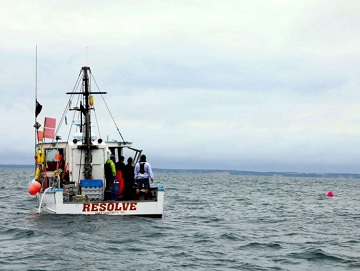
Despite threats from fellow fishermen, Mass lobstermen press to allow ropeless fishing in closed areas
The lobstermen viewed themselves as trailblazers, even calling themselves “Pioneers for a Thoughtful Coexistence”. In an effort to prove that there’s a way for their industry to resume fishing in coastal waters where Massachusetts banned lobstering to protect endangered whales, they have asked regulators to allow them to set their traps without vertical buoy lines. “I’ve been trying my best to get our guy’s back fishing,” said Michael Lane, 46, a lobsterman who fishes 800 traps out of Cohasset. But when Lane’s group presented at a recent public hearing their proposal to fish with experimental rope less gear, which would use remotely triggered inflatable balloons or other devices to surface the traps, they were pilloried by their fellow fishermen. >click to read< 19:20

Lobster industry is anxious over upcoming North Atlantic right whale protection rules
The federal government is working on new rules designed to reduce risk to North Atlantic right whales,,, One of the threats the whales face is entanglement in ropes that connect to lobster and crab traps in the ocean. Early indications show that the changes required by the rules could be significant. They’re also vulnerable to ship strikes, and face the looming threat of warming oceans. Acting NOAA Fisheries Assistant Administrator Paul Doremus said in June that the U.S. and Canada, which also harvests lobsters, must “take and sustain additional efforts to reduce right whale mortalities and serious injuries.” >click to read< 10:39
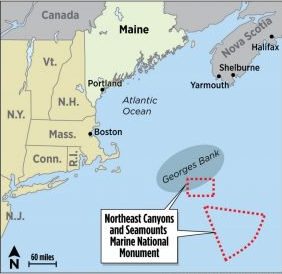
A legal war, a Biden win: What’s next for Northeast Canyons and Seamounts Marine National Marine Monument?
Lobstering groups say they aren’t opposed to protecting the natural habitats that sustain their industry. But they question whether the 5,000-square-mile monument is consistent with the Antiquities Act’s provision that designations be limited to the “smallest area compatible” with protecting the rich supply of marine life and corals that populate the Atlantic site. They also questioned the Obama administration’s position, which Trump officials have defended in court,,, Blocking off industry’s access to thousands of square miles of the Atlantic Ocean should require a little more public input, the fishing groups argue. Trump instead chose to preserve the site, although he traveled this summer to Maine to announce that he would lift all fishing restrictions in the monument.,, And in a matter of weeks, President-elect Joe Biden, who was vice president when Obama created the Atlantic monument, will be sitting in the White House. >click to read< 08:05
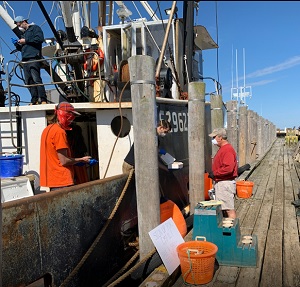
Unmoored and unsure, fishermen make do – Direct boat sales stem the tide for some.
Saturday, folks came to Menemsha to buy directly off the decks of local scallop boats. Business was brisk. Captain Sam Hopkins, aboard the Endurance, mongered to a steady queue of masked customers. Like the nearby Martha Rose, sea scallops off the Endurance sold for $15 per pound. “It was really nice to have some local support and have people who bought scallops right off the boat,” Hopkins said. Lobsterman Jason Gale has also turned to direct boat sales. From the deck of the Watch Out at Lake Street Landing he sold lobsters at $8 apiece, regardless of weight, on Saturday. Gale said he put a 10 lobster cap per customer and sold out. photos, >click to read< 15:59

Coronavirus: COVID-19 hits lobster industry hard
On the day when Massachusetts restaurants officially were barred from offering on-site dining for at least three weeks, boat prices for live lobster were reported to dip to as low as $3 a pound in Maine and $3.25 in Massachusetts and wholesale dealers were trying to determine their next steps. “Right now, we’re trying to figure out what we’re going to do,” said Joe Ciaramitaro, one of the owners of Capt. Joe & Sons in East Gloucester.,, “It’s tricky right now,” said Monte Rome, owner of Gloucester-based Intershell. “The restaurant business for us is obviously over for now. It’s one minute at a time, not even one day at a time.” >click to read< 05:58
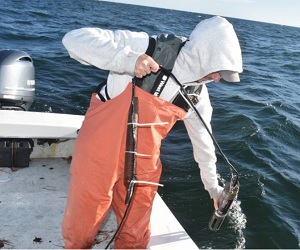
Mysterious Lobster Deaths In Cape Cod Raise Climate Change Concern
Last month, lobstermen in Cape Cod Bay hauled up something disturbing. In one section of the bay, all of their traps were full of dead lobsters. Research biologists went to work trying to solve the mystery, and what they found suggests we may see more of this as the climate changes. But what was killing everything in the traps? “I don’t think any of us have heard reports of that before, at least not like that, where we had multiple fishermen all calling the same day, saying something’s going on,” said Steve Wilcox, one of the Massachusetts Division of Marine Fisheries’ biologists assigned to the case. >click to read< 19:28
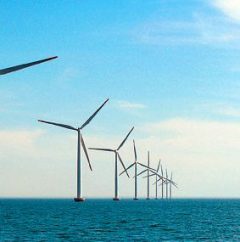
EnBW North America hires fisheries liaison
EnBW North America has appointed Beth Casoni as the company’s fisheries liaison and has joined the Responsible Offshore Development Alliance’s (RODA) joint industry task force devoted to address issues of mutual interest to commercial fisheries and offshore wind. The company said its immediate attention is on the New York Bight – an area off the coasts of New York and New Jersey, where the federal Bureau of Offshore Energy Management is expected to auction wind lease areas in late 2020. >click to read< 11:22
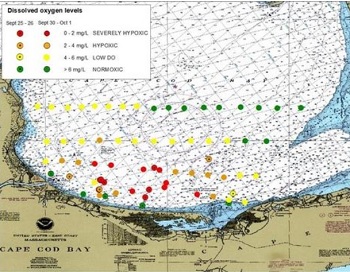
Lobsters, fish fall victim to low oxygen levels in Cape Cod Bay
Two weeks ago, lobstermen working off Scorton Creek started seeing something they had never experienced. Lobsters, in fact everything in their traps, were coming up dead. Massachusetts Division of Marine Fisheries senior biologist Robert Glenn started fielding phone calls from puzzled fishermen Sept. 23. The fishermen were worried there might be something in the water that was killing the lobsters, fish, shellfish, even sea worms. It turns out, it was something missing from the water: oxygen. >click to read< 09:15
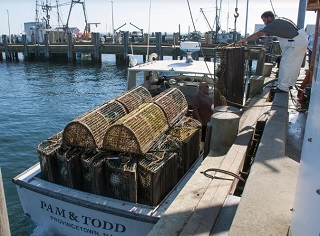
China tariffs sinking overseas sales, Provincetown lobstermen not feeling the pinch
“It’s killed our price. It’s killed our markets,” said state Rep. Ann-Margaret Ferrante of Gloucester.,,, Multiple Massachusetts businesses, especially those in Gloucester, have been adversely affected as they cannot compete with Canadian wholesale prices. But the lobstermen themselves are not feeling the pinch, and if anything are seeing their prices rise, Massachusetts Lobstermen’s Association Executive Director Beth Casoni said. “The fishermen are happy,” Casoni said. “They’re making money.” >click to read< 09:29

BOURNE: Lobstermen seek help in protecting right whales, Testimony cites burden on local industry.
Commercial lobstermen urged federal regulators Wednesday to take Canada to task for its failure to protect North Atlantic right whales and to remember that local lobstermen carrier a heavier burden of regulation than others in U.S. waters. “We as lobstermen do not want to see harm come to the right whale,” Plymouth lobsterman Tom O’Reilly said at a public forum at Upper Cape Cod Regional Technical School, the eighth in a series of meetings held this month,,, >click to read<08:40

Lobster processing claws its way into Mass. law
The long-sought measure to expand and modernize lobster processing regulations in Massachusetts is now law, as of Gov. Charlie Baker’s signature on Wednesday.,,, Senate Minority Leader Bruce Tarr, R-Gloucester, who has championed the measure through more than four frustrating legislative cycles, estimated that up to 80 percent of lobsters landed in Massachusetts — the nation’s second-largest harvester of American lobsters, behind Maine — are transported to out-of-state processors only to see them return here as value-added products for retail and restaurant consumers. >click to read< 09:11
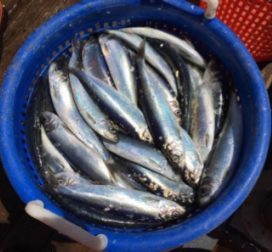
Atlantic Herring: Fishermen face another quota cut, could hit lobster prices
Regulators on the East Coast are contending with a drop in the population of herring, a key forage fish species that has been used as lobster bait for generations.,, A fishery management board is due to make a decision about the 2020 catch limits in early June.,, “I’ve heard from other fishermen up and down the coast, from Maine to Massachusetts. It’s going to be survival of the fittest,” Casoni said. “Every year is challenging, and every year just gets a little more.” >click to read<11:16
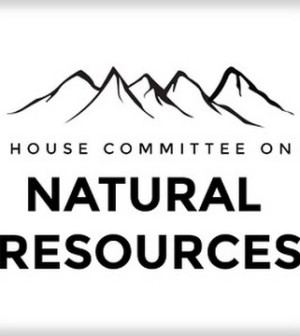
Facts and Data Prevail at House Hearing on Oceans and Climate Change
The U.S. House of Representatives’ Natural Resources Subcommittee on Water, Oceans, and Wildlife held a hearing on ocean health and climate change, moderated by Subcommittee Chair Jared Huffman (D-CA) and Ranking Member Tom McClintock (R-CA). Among the witnesses called by the majority were Carol Browner, administrator of the U.S. Environmental Protection Agency during the Clinton administration, and Beth Casoni, executive director of the Massachusetts Lobstermen’s Association. Wind Farm Dangers, Lobster Controversy, Claims of Rising Sea Level, Hurricane Link Debated, >click to read<11:45
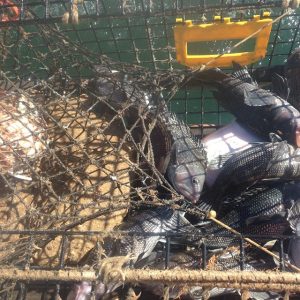
Black sea bass gobbling up lobsters
Black sea bass, a saltwater fish taken commercially and recreationally in Massachusetts, have increased in number throughout southern New England waters and rattled the lobster industry with their wolfish appetites. “They feed aggressively,” Rutgers University marine biologist Olaf Jensen said. “They’re not picky eaters. If it’s the right size and it’s alive, they’ll eat it.” The young of New England’s iconic crustacean fall into the right size category. “Black sea bass love little lobsters,” Michael Armstrong, assistant director of the Massachusetts Division of Marine Fisheries, said. That’s of deep concern to Beth Casoni, president of the Massachusetts Lobstermen’s Association, who says lobster traps are being pillaged by these fish. >click to read<18:41
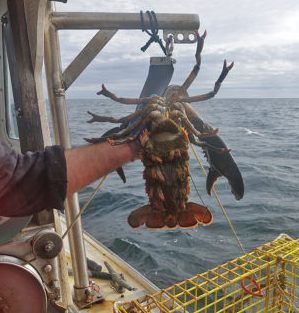
Efforts Underway to Reduce Lobster Fishing Gear to Help Rare Whale
Interstate fishing managers are starting the process of trying to reduce the amount of lobster fishing gear off the East Coast in an attempt to help save a declining species of rare whale. The Atlantic States Marine Fisheries Commission announced this month that it would consider options designed to reduce vertical lobster fishing lines in the water by as much as 40 percent. The commission said it would try to reduce the amount of gear with a combination of trap limits, seasonal closures, changes to gear configuration and other methods. The rules are under development and it will take months before they come up for public hearings. >click to read<10:45
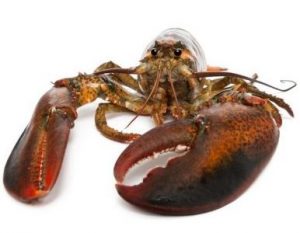
We’ll take your lobsters, eh? Canadian imports from US soar
Trade hostility from across the ocean was supposed to take a snip out of the U.S. lobster business, but the industry is getting a lifeline from its northern neighbor. Heavy demand from Canada is buoying American lobster as both countries head into the busy holiday export season, according to federal statistics and members of the industry. It’s a positive sign for U.S. seafood dealers and fishermen, even as the industry struggles with Chinese tariffs.,, >click to read<12:05






